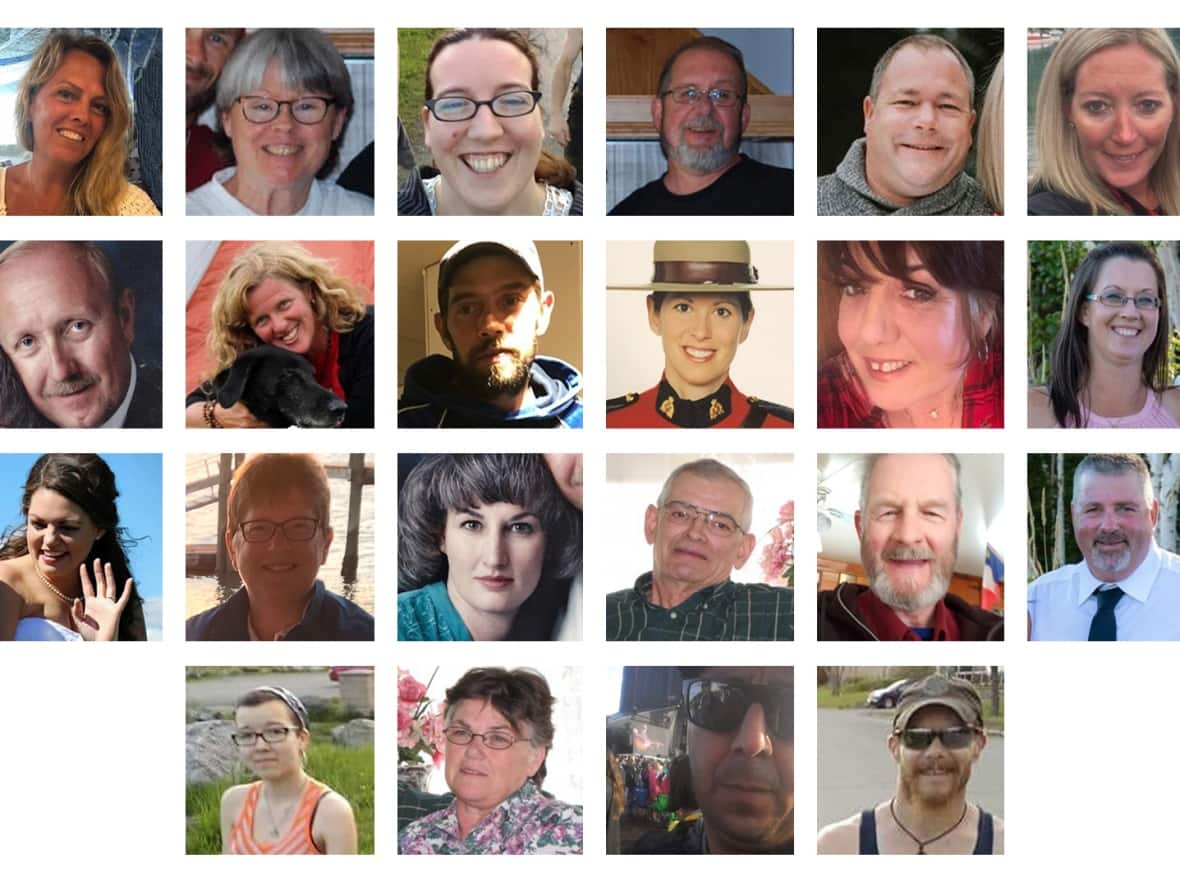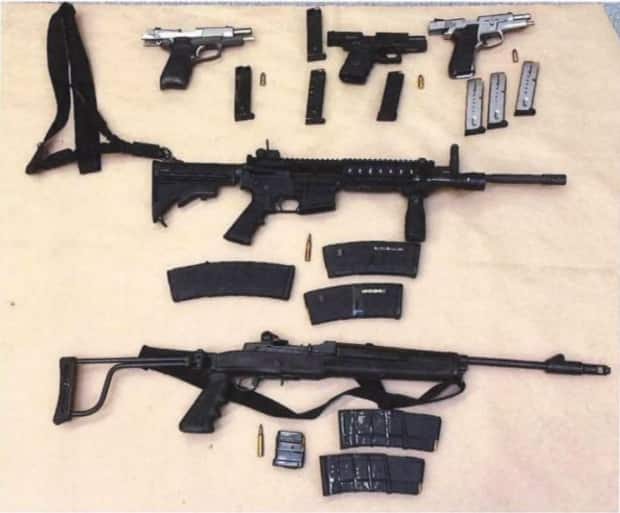N.S. mass shooting report condemns RCMP failures, calls for dramatic reforms

Nearly three years after 22 people were killed across Nova Scotia, an inquiry into the mass shooting has delivered a scathing report denouncing the RCMP for failing to warn community members of the danger they were in, depriving them of potentially life-saving information.
The commissioners also turned their eye to how an "epidemic" of domestic violence played a role in the rampage.
After listening to seven months of witness testimony and reviewing thousands of pages of documents, the Mass Casualty Commission released its final, sprawling report Thursday with 130 recommendations across more than 3,000 pages.
The report took aim at the RCMP's response to the crisis, on almost every level. It called out a lack of preparation, a lack of communication and a lack of leadership — issues so pertinent and prevalent the commissioners are calling for a rethink of how the entire force operates.
LIVE NOW | RCMP speak to reporters following release of inquiry report
"More than two years after the event, RCMP leadership had done very little to systematically evaluate its critical incident response to the deadliest mass shooting in Canada's history," noted the commissioners in the report.
"In our process, it was apparent that the organizational structure of the RCMP both contributes to these failings and makes it challenging to hold the organization accountable for its work."
The RCMP was woefully unprepared to handle the events of April 18 and 19, 2020, according to the report, despite previous recommendations out of past tragedies.
The responding detachment in Bible Hill, N.S., didn't have an emergency operational plan, despite national guidelines following the Parliament Hill shooting in 2014. The plans are meant to prepare the force ahead of an incident so that if a crisis arises, questions such as roles and responsibilities and access to resources are already understood
Mounties on the ground also weren't aware of plans that were supposed to be in place.
For example, following the shooting in Moncton, N.B, that killed three Mounties in 2014, recommendations were made to establish an emergency operational plan that identified major transport routes and critical locations to stop or contain an active threat from moving across the province.
"However, those in command of the critical incident response of April 18 and 19, 2020, were unaware of the existence of this plan, and it was not used during the mass casualty," said Thursday's report.
It also said information gleaned by 911 call-takers in the RCMP Operational Communications Centre was incomplete and not always passed along.
The lack of preparedness caused chaos and confusion on the ground with the responding officers unclear of the command structure.
The report also criticized how the RCMP failed to grasp that the gunman was driving an authentic-looking replica police car, despite being told by multiple witnesses.
RCMP failed to warn community of danger: report
Some of the harshest condemnation issued by commissioners was saved for the RCMP's decision to withhold information from the public. That included that the gunman had left Portapique — the rural area where his rampage began — and that he was disguised as a police officer and was driving across the province in that replica vehicle.
"The RCMP's failure … deprived community members of the opportunity to evaluate risks to their safety and to take measures to better protect themselves," wrote the commissioners.
Some victims' families, especially those who were killed on the morning of April 19, have been vocal that they believe their loved ones would still be alive if the RCMP had broadcast public warnings.
The families of Kristen Beaton and Heather O'Brien told the commission that if the two women had known the perpetrator had left Portapique and was disguised as a police officer, they would have stayed home that morning.
The family of Gina Goulet also told the commission that if she had known about the gunman on the loose, she could have sought safety with family or neighbours.
The force also used tweets to communicate with the public during their hunt for the gunman instead of broadcasting a warning using the Canadian emergency alerting system.

There was immediate pushback after the shootings from people who pointed out the challenges of internet access in rural parts of the province and that the vast majority of residents would not have used Twitter — views reflected by the commissioners in their report.
They wrote that the first tweet sent at 11:32 p.m., which simply referred to a "firearms complaint," underplayed the seriousness of the threat to the public.
"The RCMP conveyed accurate info to the public in a timely manner in Moncton in 2014, the same cannot be said of the RCMP's use of social media in Nova Scotia in 2020," said the report.

In the report, the commission said the lack of public warning is "symptomatic of an institutional culture that undervalues community relationships and public communications."
During the inquiry, the commission heard from several RCMP members who said that sharing information quickly and widely during an incident like a mass shooting could incite panic and put their officers in danger.
The report said those points are "myths" that have no legitimate place in police decision-making about warning the public about an active threat.
Report calls for a review of RCMP model
The commissioners say the RCMP is in need of a fundamental change, noting there have been other commissions and reports in the past that have unsuccessfully called for reform.
"Past inquiries have concluded that these problems create a toxic workplace culture within the RCMP. We find that they also impede the RCMP's operational effectiveness."
Out of 130 recommendations in the report, more than half are aimed at the RCMP and policing culture.
One of the defining recommendations calls for the federal public safety minister to commission an independent review of the RCMP and to examine the force's approach to contract policing and work with contract partners, such as the province of Nova Scotia.
The report also recommends that:
The RCMP adopt a policy of admitting its mistakes, accepting responsibility for them, and ensuring that accountability mechanisms are in place for addressing its errors.
The demonstrated capacity to accept responsibility for one's errors should be a criterion for any promotion within the RCMP.
The RCMP phase out the Depot model of RCMP training by 2032 and Public Safety Canada work with provinces and territories to establish a three-year degree-based model of police education for all police services in Canada
A number of the recommendations also touch on how the RCMP in Nova Scotia responded, including implementing emergency plans, sharing the best available information of a threat to the public as soon as possible and establishing clear protocols for unified command posts.
Others policing recommendations include that:
The RCMP's national communications policies should be revised to state clearly that the objective of the RCMP's public communications is to provide accurate information about the RCMP's operations, and in particular to respond to media questions in a timely and complete manner
The RCMP and Nova Scotia Emergency Management Office should review call-taker recruitment and training to ensure that 911 call-takers are trained to capture all information shared by a community member as fully and accurately as possible, and to listen for background noises or information that may also be important for first responders
Within 90 days of a mass casualty incident occurring, the RCMP should initiate an after-action review to be conducted by an arm's-length reviewer
The province of Nova Scotia should ensure that specialized policing services are adequate, effective, and efficiently organized to meet the demand throughout Nova Scotia, whether by contract with RCMP or by other means.
The RCMP should work with the RCMP Veterans Association to ask retired members to return items in their personal possession, including badges that have not been encased in plastic and uniforms
Funds needed to address intimate-partner violence
The commission wrote that while no one could have predicted the gunman's specific actions to take the lives of 22 people, his "pattern and escalation of violence could and should have been addressed."
They said many red flags about his violent and illegal behaviour toward his long-time partner Lisa Banfield, his family members and patients in his practice as a denturist were known by a range of people, and had been brought to authorities over a number of years.

A main finding was that this pattern was facilitated by the power and privilege he experienced as a wealthy white man with professional status.
"Gender-based, intimate partner, and family violence is an epidemic. Like the COVID-19 pandemic, it is a public health emergency that warrants a meaningful, whole of society response," the report said.
Better response, aftermath support needed
The report supports testimony from the victims' families that the services offered by the RCMP and Nova Scotia Victim Services were not enough.
Families have regularly spoken about how the one officer assigned to handle the loved ones of 21 victims was overwhelmed and unable to properly help or share information equally. The family of the one RCMP officer who was killed, Const. Heidi Stevenson, had their own liaison officer.
The report recommends the federal government start a resource hub by September 2023 which would be a "centre of expertise" for victims and their families and have the RCMP update its policies on family liaison officers and next of kin notifications.
Other recommendations include a dedicated telephone line for individuals seeking information about family or friends, and a website. The time standard for mobilizing the victim-management plan should be 90 minutes from the time a critical incident response is activated.
Gun control, Alert Ready changes
The report also discusses the need for changes around firearm possession and the cross-border smuggling of guns and ammunition into Canada.
The commissioners wrote that the issue is influenced by the United States discourse centred on a right to bear arms "which does not exist in our constitutional and legal structure."
The commission recommends the Criminal Code be changed to prohibit all semi-automatic handguns, semi-automatic rifles, and shotguns that discharge centre-fire ammunition or can accept detachable magazines with capacities of more than five rounds; and ban the use of a magazine with more than five rounds.

The report also sided with critics of the national public emergency alert system, Alert Ready.
The commissioners wrote that responsibility for alerting the public must be shifted away from a private provider. Currently, the Ontario-based company Pelmorex owns Canada's Alert Ready software system and operates it on behalf of the federal government.
The commissioners recommend that all levels of government should conduct a review of public alerting to determine how the Alert Ready system can be reformed to meet the legal responsibility to warn people of emergencies.
The inquiry was mandated jointly by the province and by Ottawa and is expected to cost around $47 million in funding from the two levels of government.
The commissioners end their report with a plea to police, government and Canadians to heed their recommendations, dedicating 82 pages on how to implement their findings and a tracking system for accountability.
"We recognize that the extensive agenda is daunting," they wrote. "But we emphasize that inaction is also a form of action and that spectatorship is an inadequate response."
If you are experiencing distress or overwhelming emotions at any time, you can call the Nova Scotia Provincial Crisis Line 24/7 at 1-888-429-8167. The Nova Scotia Provincial Crisis Service can also provide contacts for other crisis services that are available if you live outside Nova Scotia.
If you or someone you know is struggling in any way, you can call 211 or visit 211.ca. 211 offers help 24 hours a day in more than one hundred languages and will be able to connect you directly to the right services for your needs.
The Kids Help Phone is a national helpline that provides confidential support at 1-800-668-6868 or Text CONNECT to 686868.
Additional supports for across Canada are available at www.wellnesstogether.ca.
MORE TOP STORIES


